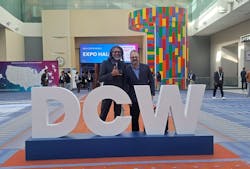Nomads at the Frontier: Nabeel Mahmood on the Future of Data Centers and Disruptive Sustainability
WASHINGTON, D.C.— At this year’s Data Center World 2025, held earlier this month at the Walter E. Washington Convention Center, the halls were buzzing with what could only be described as industry sensory overload. As hyperscalers, hardware vendors, and infrastructure specialists converged on D.C., the sheer density of innovation underscored a central truth: the data center sector is in the midst of rapid, almost disorienting, expansion.
That made it the perfect setting for the latest episode in our ongoing podcast miniseries with Nomad Futurist, aptly titled Nomads at the Frontier. This time, I sat down in person with Nabeel Mahmood, co-founder and board director of the Nomad Futurist Foundation—a rare face-to-face meeting after years of remote collaboration.
“Lovely seeing you in person,” Mahmood said. “It’s brilliant to get to spend some quality time at an event that’s really started to hit its stride—especially in terms of content.”
Mahmood noted a welcome evolution in conference programming: a shift away from vendor-heavy pitches and toward deeper, mission-driven dialogue about the sector’s true challenges and future trajectory. “Events like these were getting overloaded by vendor speak,” he said. “We need to talk about core challenges, advancements, and what we’re doing to improve and move forward.”
A standout example of this renewed focus was a panel on disruptive sustainability, in which Mahmood joined representatives from Microsoft, AWS, and a former longtime lieutenant of Elon Musk’s sustainability operations. “It’s not just about e-cycling or carbon,” Mahmood emphasized. “We have to build muscle memory. We’ve got to do things for the right reasons—and start early.”
That starting point, he argued, is education—but not in the traditional sense. Instead, Mahmood called for a multi-layered approach that spans K–12, higher education, and workforce reskilling. “We’ve come out from behind the Wizard of Oz curtain,” he said. “Now we’re in the boardroom. We need to teach people not just how technology works, but why we use it—and how to design platforms with real intention.”
Mahmood’s remarks highlighted a growing consensus among forward-thinking leaders: data is no longer a support function. It is foundational. “There is no business, no government, no economy that can operate today—or in the future—without data,” he said. “So let’s measure what we do. That’s the KPI. That’s the minimum threshold.”
Drawing a memorable parallel, Mahmood compared this kind of education to swimming lessons. “Sure, you might not swim for 20 years,” he said. “But if you learned as a kid, you’ll still be able to make it back to shore.”
Inside-Out Sustainability and Building the Data Center Workforce of Tomorrow
As our conversation continued, we circled back to Mahmood’s earlier analogy of swimming as a foundational skill—like technology fluency, it stays with you for life. I joked that I could relate, recalling long-forgotten golf lessons from middle school. “I'm a terrible golfer,” I said. “But I still go out and do it. It’s muscle memory.”
“Exactly,” Mahmood replied. “There’s a social element. You’re able to enjoy it. But you still know your handicap—and that’s part of it too. You know your limits.”
Limits and possibilities are central to today’s discourse around sustainability, especially as the industry’s most powerful players—the hyperscalers—increasingly self-regulate in the absence of comprehensive mandates. I asked Mahmood whether sustainability had truly become “chapter and verse” for major cloud operators, or if it remained largely aspirational, despite high-profile initiatives.
His answer was candid.
“Yes and no,” he said. “No one's following a perfect process. There are some who use it for market optics—buying carbon credits and doing carbon accounting to claim carbon neutrality. But there are others genuinely trying to meet their own internal expectations.”
The real challenge, Mahmood noted, lies in the absence of uniform metrics and definitions around terms like “circularity” or “carbon neutrality.” In his view, too much of today’s sustainability push is “still monetarily driven… keeping shareholders happy and share value rising.”
He laid out two possible futures. “One is that the government forces us to comply—and that could create friction, because the mandates may come from people who don’t understand what our industry really needs. The other is that we educate from within, define our own standards, and eventually shape compliance bodies from the inside out.”
Among the more promising developments Mahmood cited was the work of Rob Lawson-Shanks, whose innovations in automated disassembly and robotic circularity are setting a high bar for operational sustainability. “What Rob is doing is amazing,” Mahmood said. “His interest is to give back. But we need thousands of Robs—people who understand how it works and can repurpose that knowledge back into the tech ecosystem.”
That call for deeper education led us to the second major theme of our conversation: preparing the next generation of data center professionals.
With its hands-on community initiatives, Nomad Futurist is making significant strides in that direction. Mahmood described his foundation as “connective tissue” between industry stakeholders and emerging talent, partnering with organizations like Open Compute, Infrastructure Masons, and the iMasons Climate Accord.
Earlier this year, Nomad Futurist launched an online Academy that now features five training modules, with over 200 hours of content development in the pipeline. Just as importantly, the foundation has built a community collaboration platform—native to the Academy itself—that allows learners to directly engage with content creators.
“If a student has a question and the instructor was me or someone like you, they can just ask it directly within the platform,” Mahmood explained. “It creates comfort and accessibility.”
In parallel, the foundation has beta launched a job board, in partnership with Infrastructure Masons, and is developing a career pathways platform. The goal: to create clear entry points into the data center industry for people of all backgrounds and education levels—and to help them grow once they’re in.
“Those old jobs, like the town whisperer, they don’t exist anymore,” Mahmood quipped. “Now it’s Facebook, Twitter, social media. That’s how people get jobs. So we’re adapting to that.”
By providing tools for upskilling, career matching, and community-building, Mahmood sees Nomad Futurist playing a key role in preparing the sector for the inevitable generational shift ahead. “As we start aging out of this industry over the next 10 to 20 years,” he said, “we need to give people a foundation—and a reason—to take it forward.”
A Broader Lens: Beyond Engineering to the Full Data Infrastructure Stack
Data Center Frontier: So Nomad Futurist isn’t just focused on engineering pathways. What is the full breadth of career opportunities you’re trying to open up?
Nabeel Mahmood: Yeah, so it's sciences, right? Obviously, the emphasis is on engineering—but is it really? We've taken a slightly different approach. For us, it's not just a data center play. It’s a data infrastructure play.
That includes data centers as a core component, but it also spans electrical, mechanical, structural, architectural, and civil engineering—so yes, the traditional “engineering flight.” But it also includes coding, programming, the full technology stack: How do you build servers? How do you build storage? How do you build networks?
Then there’s the cybersecurity component, the financial modeling aspect, and even visual arts. Think about user interfaces—how do you design something people want to use? How do you communicate technical ideas clearly through UI and UX? And when someone likes an interface, how do they deploy their application? Where’s it hosted? How’s the data moved around? What data center does it live in? Then you’ve got regulation, compliance, privacy—GDPR, CCPA, all of it.
So yes, it includes STEM, but it’s much broader than that. Communication, for instance, is a critical skill we still struggle with in our sector. We make things way too complicated. We’ve probably generated more acronyms than any other industry in the last four decades.
At its core, the mission is to demystify technology—to speak at a human level, to generate excitement and understanding that brings new people into our space.
A Global Standard, Not a Local Band-Aid
Data Center Frontier: Is there a regional focus to where you’re trying to have an impact? Tier 1 or Tier 2 markets?
Nabeel Mahmood: We’re taking a global approach. If you’re only solving a problem at the zip-code level, you’re just putting on a band-aid.
What we need is a universal standard—a shared language. Because data is global. Data is binary—ones and zeroes. Like currency, it might have different forms, but the concept needs to be understood across geographies. It has to be unified.
We're doing this through strategic alliances—with groups like Infrastructure Masons, AFCOM, and others that already have local charters and on-the-ground traction. And you know this, Matt—we’ve been a 501(c)(3) for just under two and a half years. We think of it this way: be like water. Go where there’s the least resistance. That stream becomes a river, and eventually, it reaches the ocean.
What's Changed at Data Center World? Collaboration and Real Talk
Data Center Frontier: We’re here at Data Center World 2025. What’s stood out to you most about this year’s conversations?
Nabeel Mahmood: Honestly, when you come to big events like this, there's usually a bit of fear that you’ll be oversold—every vendor wanting your time, trying to push their product. But this year? That hasn’t happened. It’s been different—in a good way.
We’re seeing new faces—people who’ve never been part of this space before. Companies showcasing real solutions that weren’t even on the radar a year or two ago. It’s opening the door to folks from adjacent verticals. That’s encouraging.
And there’s more collaboration. It used to be, especially 25 or so years ago, that you wouldn’t even talk to your competitors. Now, we’re actually talking about working together. Co-opetition. That’s a big shift.
The content this year has been some of the most powerful I’ve seen. The conversations are grounded. It’s not just about the future—it’s about what’s happening right now. We’re not dreaming about 600kW racks—we’re actively working to solve the problems compute density is already throwing at us.
What’s really encouraging is people aren’t just interested—they’re ready to act. To collaborate, to spread awareness, to engage with policymakers before policies are imposed on us.
Power, Natural Gas, and the Road to Fusion
Data Center Frontier: The power conversation is so dominant that we now have upcoming a whole separate Data Center World conference for it. Where do you stand on natural gas and the broader energy mix?
Nabeel Mahmood: There isn’t one answer. Natural gas? Sure, it's still a fossil fuel, still tied to legacy infrastructure. But it absolutely has a role as an interim solution—especially when we face real limitations in grid capacity, PPA delays, and short-term demand spikes.
What Dave [Bell] is doing with microgrids and Voltigrid—that’s addressing the challenge right now. It’s a smart step in the short term.
But long term? We need to think bigger. We need to invest in hydrogen—there’s a gigawatt-scale hydrogen project in Texas, and others in Europe. We need to push forward on SMRs and nuclear. And personally, I’m a big advocate for fusion.
Fusion is the real game-changer. I know there’s been a lot of hope around Helion, especially with Microsoft’s interest, but the National Ignition Facility had a breakthrough too. That’s where our tax dollars should be going. Let’s fund that R&D. Let’s build the future, not just patch the present.
On Nvidia as the Industry's Center of Gravity
Data Center Frontier: One last question—might be fraught territory—but what’s your take on Nvidia? It feels like the whole industry is orbiting them.
Nabeel Mahmood: [Laughs] Well, I hope Jensen doesn’t blacklist me, but here's the truth: what Nvidia has done is remarkable. They’ve transformed not just data centers but the entire tech landscape. From nearly bankrupt twice to becoming the most valuable company in the world—it’s an amazing story.
That said, their GPUs are incredibly power-hungry. There’s room for optimization. And competitors are coming. There’s a ton of capital out there ready to challenge Nvidia’s dominance. I expect some major shakeups in the next 2–3 years.
Be the Change
Data Center Frontier: Final thoughts for this episode of Nomads at the Frontier?
Nabeel Mahmood: We need to be the change agents. You, me—everyone in this room. Question. Probe. Learn. We’re not going backward. Technology is only going forward.
The quality of life today, globally, is vastly better than it was a hundred or a thousand years ago. Let’s keep moving forward—for the right reasons. Let’s combine our knowledge and resources and leave the world better than we found it for the next generation.
Podcast Series
Nomad Futurist is a 501(c)(3) non-profit organization established, per its mission statement, "to demystify the world of digital infrastructure and the related technologies that impact every aspect of our daily lives." Committed to educating youth in underprivileged communities, promoting diversity and inclusion, and opening up opportunities for growth and new career paths, the group says its "primary focus is to empower and inspire younger generations through exposure to the underlying technologies that power our digital world."
Nomad Futurist is known for appointing individuals throughout the data center industry to its ranks of Ambassadors and Advisors, who work to promote the organization's ethos and goals in their professional spheres. The group's members are a pervasive presence in the data center sector, to be found in attendance and presenting at most industry events in the U.S. and abroad. The purpose of the Data Center Frontier/Nomad Futurist joint podcast series is therefore to gather valuable industry insights, expertise and commentary from Nomad Futurist leaders and ambassadors, firsthand and in the field, as they participate in these events.
Recent DCF Show Podcast Episodes
-
Flexential CEO Chris Downie on the Data Center Industry's AI, Cloud Paradigm Shifts
-
ark data centers CEO Brett Lindsey Talks Colocation Rebranding for Edge, AI Initiatives
-
CyrusOne CEO Eric Schwartz Talks AI Data Center Financing, Sustainability
-
Prometheus Hyperscale Pushes Data Center Horizons to 1 GW
-
Quantum Corridor CEO Tom Dakich On U.S. Midwest Data Center Horizons
Did you like this episode? Be sure to subscribe to the Data Center Frontier show at Podbean to receive future episodes on your app.
Keep pace with the fast-moving world of data centers and cloud computing by connecting with Data Center Frontier on LinkedIn, following us on X/Twitter and Facebook, as well as on BlueSky, and signing up for our weekly newsletters using the form below.
About the Author
Matt Vincent
A B2B technology journalist and editor with more than two decades of experience, Matt Vincent is Editor in Chief of Data Center Frontier.



